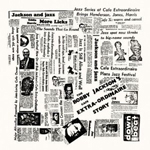|
|
 |
Dusted Reviews
Artist: Bobby Jackson Album: The Café Extra-Ordinaire Story Label: Jazzman Review date: Oct. 6, 2010 |

|
|
|
 |
One of Jazzman Records’ self-appointed missions is the resurrection and reissue of “Holy Grail” LPs that have not gotten their due. When The Café Extra-Ordinaire Story first came out in 1977, it was already an old-fashioned relic of a bygone sound and a fading scene. Heard today, it’s a reminder that there’s much more to the jazz canon than the lineage of big names in the Blue Note and Prestige catalogues. There are no stars on this record, although some of its musicians played with a few when they came through Minneapolis in the late 1960s and early ’70s. That’s when bass player and shoestring impresario Bobby Jackson ran the Café Extra-Ordinaire, a venue devoted to straight-ahead jazz.
By 1966, jazz was dying as a commercial and popular phenomenon, and had not yet been reborn in its current guises as cultural institution, brunch background noise and indie avant-garde movement. There was no consistent place in the Twin Cities for jazz musicians to play. So, Jackson quit his day job in order to open one. Initially the café lacked a liquor license, and during its five-year run, it inhabited three different locations. But it managed to bring in some big names, like Eddie Harris and Freddie Hubbard, and sponsor a major festival before Jackson got disillusioned and packed it in. Club-management duties kept Jackson from playing often at the Café, but he was poised and ready when Moon Sound Studios, which was run by George Garrett (the guy who recorded The Trashmen), had some downtime and let the club’s regular musicians lay down a few tunes. Jackson is the sole bassist on this record, and the only musician to play on every track. It fell to him to put it out, too. While a couple tunes came out on a single released by the Extra-Ordinaire label during the club’s existence, he didn’t get around to making an LP until 1977, a half-dozen years after the club closed down.
The other musicians include tenor saxophonist Morris Wilson, trombonist Beau Bailey and trumpeter Sam Bivens; pianists Paul Akre, Bobby Lyle and Hubert Eaves; and drummers Tony Moreno, Gene Hubbard and Paul Cotton. None of them break any new ground, but they had good taste in who to borrow from. Lyle’s high-arching piano lines on “Bobby’s Blues” not only sound just like the moments when McCoy Tyner surged to the fore of the John Coltrane Quartet circa 1963; they capture that music’s pressured abandon. Eaves’ “Understanding” is a brief, exquisite ballad that could have made it onto a mid-’50s Mingus album, although its ill-tuned piano also brings to mind the earliest Chicago recordings of Sun Ra’s Arkestra. And Bivens’ “Ebonite” has the sound, if not quite the volcanic energy, of Art Blakey’s Jazz Messengers.
So why listen to guys who were trying to sound like groups that were already gone? Two reasons. First, the tunes and performances are uniformly strong, transcending some recording gaffes (distorted horns on “Paul’s Ark” and the afore-mentioned dodgy piano) to reaffirm the music’s idiomatic virtue. In other words, it swings fluently, and the soloists make their statements with personal authority. Which brings us to the second reason; this snapshot of jazz taken far from the music’s established home in New York City shows that it could be just as alive in the hands of no-name guys as it was in the hands of the stars.
By Bill Meyer
|







